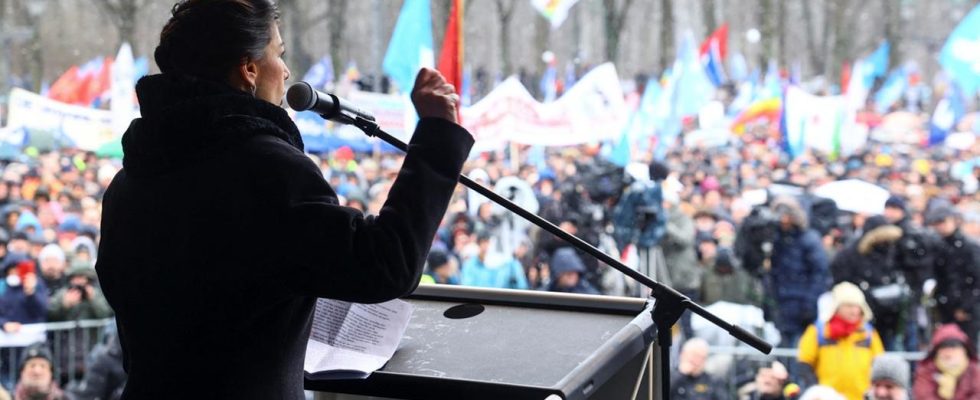analysis
The Russian war of aggression in Ukraine has brought endless suffering, death and destruction. This is why calls for peace negotiations regularly come from German politics. But the road there is likely to be rocky.
Not a week goes by when Sahra Wagenknecht doesn’t speak out in favor of a quick peace in Ukraine. For the BSW chairwoman, the matter is simple: she wants to end the Russian war of aggression immediately through negotiations and make an offer to Russian President Vladimir Putin. In return for its willingness to negotiate, the West could no longer supply Ukraine with weapons – as a confidence-building measure for Russia.
Then we can check how serious Putin is about a negotiated solution, said Wagenknecht. It is questionable, however, why anyone should offer anything to the Kremlin ruler when he himself has publicly signaled his alleged willingness to negotiate.
Similar demands come from the AfD. Party leader Tino Chrupalla also speaks in the interview of the week SWR that the federal government should rely on diplomacy. The claim that the West deliberately torpedoed peace talks in spring 2022 is often repeated. However, this claim is not actually proven.
In addition, even back then there was a lack of trust between the two warring parties for a negotiated solution. The Russian army withdrew from the suburbs of Kiev at the time, but at the same time the Kremlin reorganized its troops in order to then throw them into the east and start a new offensive, says Nicole Deitelhoff from the Leibniz Institute for Peace and conflict research.
A risky proposal at the expense of Ukraine
Ending military support for Ukraine and hoping that Putin will negotiate peace is a risky proposal, especially at the expense of the attacked Ukraine. On the one hand, the scientist Deitelhoff fears that the result will be a dictated peace that Russia could impose on Ukraine – i.e. a peace on Putin’s terms. And on the other hand, there is a very high chance that Russia will not be satisfied if Putin notices that Ukraine and its Western supporters are giving in.
In the past, there have been cases in which a warring party has offered and implemented a temporary ceasefire as a confidence-building measure – at least in one section of the front, says Deitelhoff. But that has nothing to do with Wagenknecht’s suggestion.
No situation for negotiations yet
If you ask many scientists and military experts, they don’t think the time has come for negotiations yet. Although victory on the battlefield is not in sight for either Ukraine or Russia, both sides continue to see opportunities. Even if it is a brutal, inhumane war of attrition, there is still a lack of insight that there is nothing left to be won on the battlefield.
“Russia could end the war at any time,” says Major General Wolf-Jürgen Stahl, president of the Federal Academy for Security Policy. Ukraine, on the other hand, has to fight for survival. And she has “too little to win and fortunately too much to lose.”
Given this situation, experts continue to see three tasks for the West: provide military support to Ukraine, tighten sanctions against Russia and prepare for peace negotiations in case the decisive moment comes.
Peace negotiations prepare
If Ukraine is to engage in negotiations with Putin’s Russia, then it would need, for example, really far-reaching security guarantees, including possible NATO membership. The Ukrainians’ experiences with their belligerent neighbors have been consistently bad over the past decades.
Promised security guarantees, including Western ones, after the Budapest Memorandum in 1994 have been of no use. At that time, Russia had recognized Ukraine’s independence and borders by treaty. And after Ukraine gave up nuclear weapons in return, Putin’s Russia attacked it several times.
In addition to the question of security guarantees, solutions to contentious territorial conflict issues must at least be discussed behind closed doors. If neither side actually wins the war, viable solutions are needed, for example for Crimea.
China would have to assert its influence on the Russian side, and the USA and the EU on the Ukrainian side. But we are a long way from that. Putin currently does not even recognize Ukrainian President Volodymyr Zelensky as a representative of Ukraine. Until that happens, the head of the Munich Security Conference, Christoph Heusgen, cannot imagine any substantial negotiations.
No Chancellor contact with Putin
Germany alone is unlikely to play a prominent role in such negotiations. And if you ask government spokesman Steffen Hebestreit, it becomes clear that there is currently no direct line to the Kremlin.
The last direct conversation between the German Chancellor and the Russian President took place at the beginning of December 2022, says Hebestreit at the government press conference. The Chancellery is also of the opinion that discussions have to be meaningful and it doesn’t look like that at the moment.
In practice, a quick peace is not in sight. Political scientist Deitelhoff expects a difficult peace process that will be riddled with many setbacks.
Uli Hauck, ARD Berlin, tagesschau, February 23, 2024 3:45 p.m

